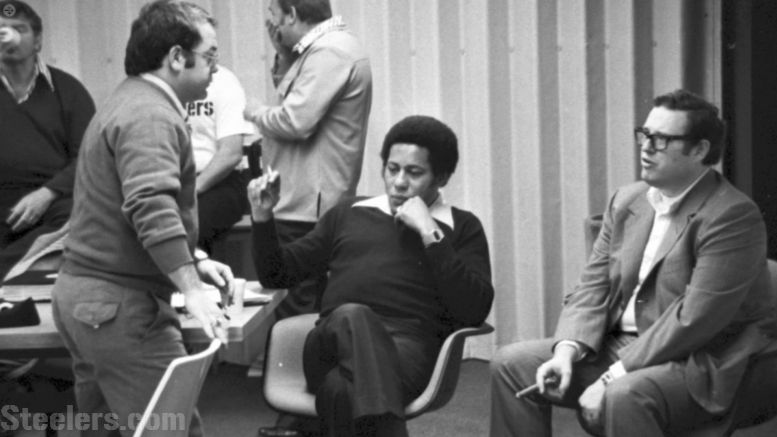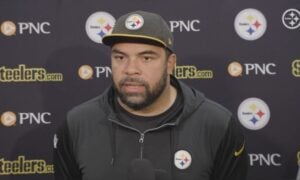The mere fact that he had continually been passed over for consideration year after year after year in the nominating process as a contributor to be enshrined into the Pro Football Hall of Fame doesn’t mean that he hasn’t long had his noteworthy champions. Those champions keeping his legacy alive finally got the job done when yesterday he was officially announced as the contributor candidate for the class of 2021.
It’s a virtual guarantee at this point that he gets in—it would be nothing short of shocking if he does not receive the necessary 80 percent approval. Contributors, when they do get nominated, very rarely fail to reach the necessary threshold.
This is generally understood, and those who knew him best were celebrating yesterday—including Donnie Shell, the safety out of the HBCU South Carolina St., whom the Pittsburgh Steelers signed as a college free agent after the 1974 NFL Draft. Shell just so happened to be named as part of the Pro Football Hall of Fame class of 2020, further adding to Nunn’s own resume for consideration.
“Happy to hear Bill Nunn is finalist for the Pro Football Hall of Fame”, Shell wrote on Twitter yesterday. “He was a great scout and a man of great character. He was my mentor and friend. More importantly he was a servant leader. One who is motivated by love and humility but demonstrated by example”.
Happy to hear Bill Nunn is finalist for the Pro Football Hall of Fame. He was a great scout and a man of great character. He was my mentor and friend.
More importantly he was a servant leader. One who is motivated by love and humility but demonstrated by example.— Donnie Shell (@donnie_shell) August 25, 2020
Those who knew Nunn best understood that he was far from just a football person. There were a lot of cheers and tears within the Steelers social media sphere yesterday from those who had the opportunity to spend time with him at some point or another.
His story is a great one and should be celebrated, as head coach Mike Tomlin alluded to yesterday. Art Rooney II said that he was “beyond thrilled” upon learning the news, and that he will “look forward to hopefully celebrating his induction next year”.
I hope Bill Nunn is is inducted into the @ProFootballHOF He was such a big part of the Steelers success in the 1970s. He helped bring in so many unheralded players who became big contributors to the team. An HOF bust would be well deserved. https://t.co/snEwy9BkbZ
— Tony Dungy (@TonyDungy) August 25, 2020
Former Steelers defensive back Tony Dungy, who went on to become a Hall of Fame head coach, also celebrated the news of his nomination, noting that “he helped bring in so many unheralded players who became big contributors to the team”. Dungy was a part of the 1978 championship team, recording six interceptions that season (trivia: he also threw two interceptions in 1977—he even threw a pick and intercepted a pass in the same game).
It wasn’t just those who were recruited by him. Peter King celebrated the news, Tweeting a picture of a Peroni beer that Nunn was known to drink, writing, “here’s to you, Bill Nunn”. King was a part of the selection subcommittee. Jim Trotter, who was on the Nunn bandwagon this year, also shared in the joy, noting that he would be the first contributor of color in the Hall of Fame if he gets the votes.
Here’s to you, Bill Nunn. pic.twitter.com/NAc523BwP4
— Peter King (@peter_king) August 26, 2020
The late Bill Nunn Jr., who spent 35 years w/ Steelers as a scout & personnel exec, is the Contributor finalist for the Pro Football Hall of Fame Class of 2021. 👏🏾👏🏾👏🏾👏🏾👏🏾 Thx to the selection subcommittee: Jarrett Bell, John Clayton, Peter King, Charean Williams, Howard Balzer.
— Jim Trotter (@JimTrotter_NFL) August 25, 2020
It’s long overdue that the man’s legacy becomes part of the annals of football as a whole, and not just Steelers history, such was the impact of his game, whether it was turning teams on to Hall of Famers from HBCUs such as Deacon Jones and Roosevelt Brown, his work with the Steelers, or simply giving players from HBCUs such a platform that such players who would ordinarily be forced to attend those schools would later be recruited to more traditional college football powerhouses, for better or for worse.








